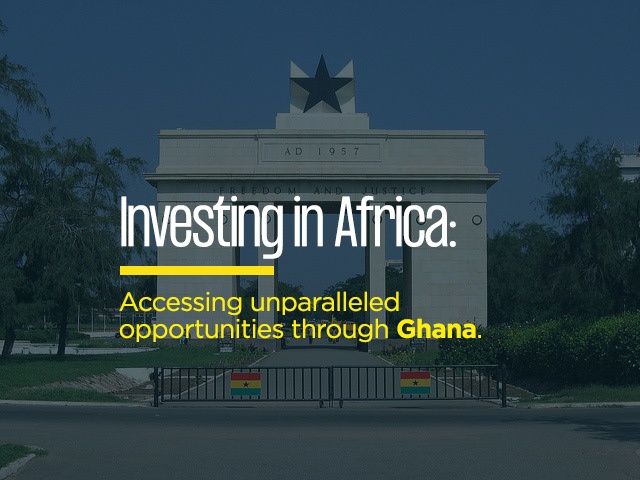There’s a fundamental yet very essential question, asked across all boardrooms in companies and institutions of all sizes, which borders around ‘where to select as the next investment destination’.
It could be about finding new partners, joint ventures, launching new products, hiring talents, opening overseas offices and investing in opportunities etc.
To be frank, this question begs various scenarios, and the final choice on where to invest and do business next could depend – and in most cases does – on multiple factors. This will come on the back of a series of marketing research and due diligence efforts to make such a final decision.
In this piece, Annan Capital Partners – based on our decades of experience in driving both public and private capital across multiple countries in Africa – looks at why Ghana should be your entry point into the African market, irrespective of your investment and business goals.
Let’s assume you are an entity seeking your next investment destination and you have Africa as a key focus market. You are open to the choice of entry into any of the 55 countries on the continent. The question is, “Why Ghana; and actually, why not Ghana?”
If you are a foreign entity and seeking to set up your organisation in Ghana, perhaps you should check out our previous insights…it could prove very useful.
Africa and Emerging Markets
Africa, and for that matter emerging market economies, have become the most attractive regions and markets driving global investment.
A deeper look at the magnitude of opportunities presented by Africa and emerging markets will certainly come to you as no surprise.
The ROI of Africa and, for that matter emerging markets, is higher than anywhere else in the world. Fundamentally, that’s a key factor to consider.
To appreciate this point, did you know that by 2025 annual consumption in emerging markets will reach US$30trillion – accounting for nearly 50% of the world’s total GDP? Also, the number of consumers in emerging markets will reach 4.2 billion out of a global population of 7.9 billion by 2025.
It’s again estimated that in developing countries, the emerging class – nearly two billion strong -spends a total of US$6.9trillion annually.
Increases in population size, urbanisation trends and technology usage are tipped to drive economic growth in Africa
Top investment destinations in Africa
The rise of the middle-class population and abundance of natural resources are key drivers for investment in the region.
Côte d’Ivoire, Ghana and Nigeria have been identified as the three most attractive African investment destinations in a 2022 Deloitte Survey.
According to Deloitte’s 2022 Africa Investment Attractiveness Index which is based on the responses of almost 200 CEOs – from both French and English-speaking African countries – to the following question: “Based on the key location factors for your industry, which African countries do you find the most attractive for investment at the present time?”
Here are the top-10 most attractive investment destinations in Africa according to the Deloitte’s 2022 Africa Investment Attractiveness Index.
- Côte d’Ivoire
- Ghana
- Nigeria
- Senegal
- Kenya
- Rwanda
- Morocco
- Tanzania
- Togo
- South Africa / Benin
Why Ghana? Why not Ghana?
As Africa’s largest gold miner and the world’s second-largest cocoa producer, Ghana has witnessed steady growth in recent years.
Let’s look at some key considerations relating to the economy, political environment, public policy and investment regulations, and which make Ghana Africa’s most attractive investment destination.
Economy & People
The size of a market matters as far as investment and doing business is concerned. Choosing a market with an appreciable population, as well as easy access to other markets in the sub-region, is a key component to consider.
According to a recent population and housing census, Ghana’s population stands at a little over 31 million people. This ranks Ghana as the 2nd-largest country in West Africa by population. Only Nigeria has a larger population than Ghana.
Ghana is an important player and a key market in the West African sub-region. This also gives you opportunity to tap into the ECOWAS region’s over-421 million market size.
Ghana has a youthful population, with some 60% of the population falling between the ages of 15 and 64 years.
According to a recent IMF report, Ghana’s economy is projected to remain relatively strong over the medium-term, supported by higher prices for key exports and strong domestic demand.
Growth is projected to reach 5.5% in 2022 and average 5.3% over 2022; and is expected to be broad-based, led by agriculture, services and a relatively stronger industry sector.
Political Environment
Ghana maintains its standing as one of the few politically stable democracies in Africa, and offers foreign investors the most secure entry into West Africa
There’s no doubt that the political environment is a key factor to analyse before making an investment decision.
Ghana is ranked as one of the most stable and democratic countries on the continent. The country entered into a democratic dispensation in 1992, and over the intervening period to now has witnessed political power exchanged between different political parties.
Political stability is a key factor because, as has been evident, billions of dollars’ worth of investment have been lost due to political risks and exposures. As an investor, securing your investment in a politically stable environment is key.
This is what Ghana offers: political stability.
Public Policy and Investment Regulations
Due to public policy constraints and a lack of a decisive and appealing investment regulation, a market can provide the highest ROI while still being unappealing to investors.
Ghana is consistently ranked amongst the top countries on the continent in terms of ease of doing business. As an investor, certainly, being able to easily invest in a market is a game-changer. Most importantly, understanding the government’s policies and investment regulations clearly is a key factor.
Ghana has some of the most transparent public policies and regulations when it comes to setting up a business, with tax regulations including tax exemptions across multiple sectors as well as specialised agencies focusing on specific key sectors.
Ghana is on the go, and has recently intensified its commitment to provide a safe, secure and investor-friendly environment. The country is doing most of these activities through the Ghana Investment Promotion Centre-GIPC, the foremost investment-attraction and promotion agency.
The Centre is mandated to make Ghana the first destination of choice for investing in Africa by providing seamless, one-stop-shop high-value-added services. Regardless of your location, submitting a simple contact form to the GIPC may be all you need to get started with investing in Ghana.
ACP has been a key player, providing timely assistance for businesses to navigate the regulatory requirements of setting up and investing in Ghana.
Stable Financial Services Industry
An equally important factor to consider is stability of the financial services sector in a country.
Ghana has a sizeable banking and financial services industry. Overall, regulation and supervision of this industry are carried out by the Bank of Ghana (BoG), the country’s central bank. The banking and finance industry in Ghana has continued to perform creditably.
Government, as a matter of urgency, undertook what has become known as a ‘financial services sector clean-up’, aimed at creating a stronger financial services industry to drive the investment agenda.
You can now be confident that your investment will be facilitated by a robust, innovative and stronger financial institution, which over the years has also seen a tremendous introduction of digital innovations.
A continent-wide market access – AfCFTA
Ghana continues to be a key player in the African Union and other sub-regional and continental organisations, as well as in the continent’s regional integration agenda as a whole.
The largest free trade zone in the world is the African Continental Free Trade Area (AfCFTA), and Ghana is host to the AfCFTA secretariat.
AfCFTA connects 1.3 billion people across 55 countries with a combined gross domestic product (GDP) valued at US$3.4trillion.
Implementation of the AfCFTA is tipped to usher in the kinds of deep reforms necessary to enhance long-term growth in African countries – and Ghana is at the centre of it, playing a pivotal role.
Looking ahead
Ghana has a lot more to offer, making it the most attractive investment destination on the continent.
Leveraging on local insights and expertise could prove critical to the outcome of investing in Ghana.
Annan Capital Partners has been playing a key role in allowing easy market access.
We combine decades of consultancy, advisory and market entrance knowledge, which can be used for your company’s establishment and expansion in Ghana and other important African markets.
Paul Frimpong, CGIA, FCCE
Paul Frimpong is a development economist, top voice on Sino-Africa relations, and an award-winning entrepreneur.
He’s currently the Global Head of Strategy & Membership at the Institute of Certified Chartered Economists (ICCE).
This article is originally curated for and published by: Annan Capital Partners.
Annan Capital Partners (ACP) is a boutique investment advisory and business development agency offering holistic wealth management and venture building services to a wide range of clients; from entrepreneurs to governments and from local SMEs to global corporations.











